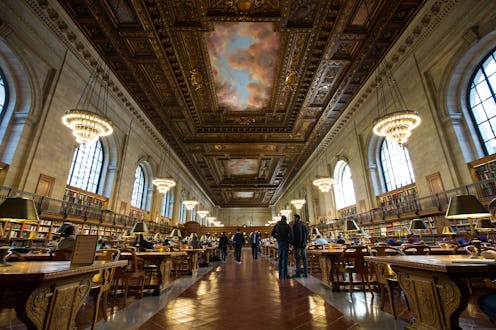Books
This Open Letter Describes What Will Happen To Libraries If Net Neutrality Is Repealed

Yesterday, on the eve of the Federal Communications Commissions' (FCC) vote on net neutrality, the presidents of the New York, Brooklyn and Queens public library systems did something very in keeping with the spirit of libraries: they banded together and they wrote a letter. If you're feeling stressed, anxious or just struggling to articulate your thoughts, check out this ode to net neutrality from the New York Public Libraries and remember: there are still good people in charge out there.
First, let's talk about net neutrality. What is being voted upon today, Dec. 14, is an unprecedented decision by the FCC to deregulate the broadband industry. The current guidelines of net neutrality, which were adopted in 2015 by former President Obama, are centered around keeping the internet free and open to the public. Repealing these rules would incentivize major corporations like Comcast, AT&T and Verizon to govern the internet and would pave the way for paid access. Essentially: individuals and corporations would have to pay for the use of fast, reliant internet. Those unable or unwilling to shell out additional fees would be relegated to a "slow lane." Broadcast companies could dictate which websites run slower or are blocked completely.
A recent poll from the University of Maryland that found 83 percent of Americans, including three out of four Republicans, were against repealing net neutrality. Ajit Pai, the Trump-appointed Chairman of the FCC, has stated he will not "bow to pressure" (to be clear, by "pressure," he means "the will of the American people" and by "bow" he means "do his job as the member of a democracy") and continue with the vote anyway.
In a letter published by The Verge, Anthony Marx, president and CEO of the New York Public Library, Linda Johnson, president and CEO of the Brooklyn Public Library; and Dennis Walcott, president and CEO of the Queens Library, explain how repealing net neutrality isn't simply a matter of, "Oh no, what about my Netflix binges?"; if we begin offering priority access to essential resources, they write, the digital divide in this country will be ripped apart.
"Since their inception, public libraries have fought to ensure that all people — regardless of their background or beliefs — have access to knowledge, education, and opportunity," the letter begins. "That noble mission hasn’t changed, even as technology has."
For many of us who grew up using public libraries, we know that they're more than book collections. Millions of people rely on public libraries as one of the few places they can receive free access to both computers and the internet.
To see who will be affected, simply walk into any New York City library branch. See the students who literally cannot do their homework without our computers. See the parents and caregivers who are learning English and applying for jobs online to improve their circumstances. See the higher education students, independent researchers, and scholars who need our databases and online collections to further scholarship. Imagine how frustrated they will be, how demoralized, that they can no longer access what they need.
Public libraries, most of whom are either non-profits or government agencies, will be forced to buy into, literally, this concept of priority access, say the NYPL heads. And that's a heavy, and in some cases an impossible, burden.